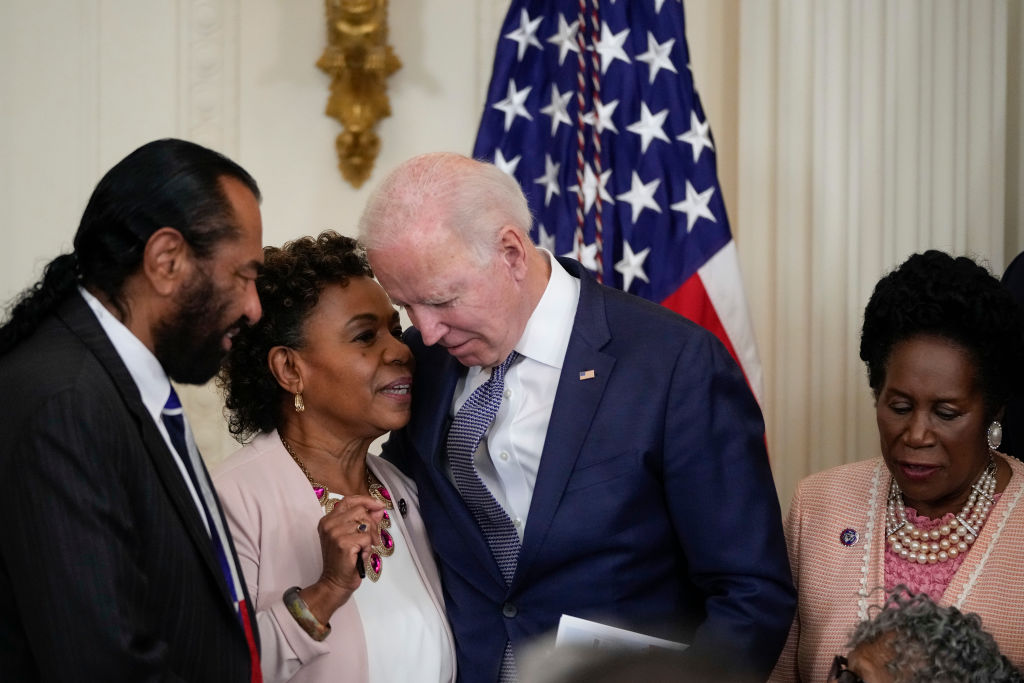The House votes to repeal 2002 military authorization for the Iraq War, with Biden's blessing


A free daily email with the biggest news stories of the day – and the best features from TheWeek.com
You are now subscribed
Your newsletter sign-up was successful
The House on Thursday voted 268 to 161 to repeal the 2002 resolution authorizing former President George W. Bush to invade Iraq. The bill to revoke the 2002 Authorization for the Use of Military Force (UAMF) had bipartisan backing — 49 Republicans voted with all but one House Democrat to pass the measure, authored by Rep. Barbara Lee (D-Calif.) — and the support of President Biden. Senate Majorit Leader Chuck Schumer (D-N.Y.) endorsed the bill Wednesday and promised to hold a vote on it later this year.
The 2002 AUMF is seen as low-hanging fruit compared with repealing the 2001 authorization to attack the parties responsible for the 9/11 terrorist attacks. Still, when the House passed Lee's 2002 AUMF repeal measure after the Trump administration assassinated Iranian general Qasem Soleimani, only 11 Republicans voted yes.
Supporters of repealing the 2002 AUMF point out that the Iraq War formally ended years ago, and there's widespread agreement that successive presidents have used the 2001 and 2002 authorization to conduct military operations only tangentially related to their original intent. Some Republicans oppose repealing the war authorizations without a replacement on deck, and the Biden White House has been negotiating with lawmakers on a 2001 AUMF successor better aligned with the current terrorism threats.
The Week
Escape your echo chamber. Get the facts behind the news, plus analysis from multiple perspectives.

Sign up for The Week's Free Newsletters
From our morning news briefing to a weekly Good News Newsletter, get the best of The Week delivered directly to your inbox.
From our morning news briefing to a weekly Good News Newsletter, get the best of The Week delivered directly to your inbox.
The Constitution gives Congress the sole power to declare war but makes the president commander-in-chief of the armed forces.
A free daily email with the biggest news stories of the day – and the best features from TheWeek.com
Peter has worked as a news and culture writer and editor at The Week since the site's launch in 2008. He covers politics, world affairs, religion and cultural currents. His journalism career began as a copy editor at a financial newswire and has included editorial positions at The New York Times Magazine, Facts on File, and Oregon State University.
-
 Palantir's growing influence in the British state
Palantir's growing influence in the British stateThe Explainer Despite winning a £240m MoD contract, the tech company’s links to Peter Mandelson and the UK’s over-reliance on US tech have caused widespread concern
-
 Quiz of The Week: 7 – 13 February
Quiz of The Week: 7 – 13 FebruaryQuiz Have you been paying attention to The Week’s news?
-
 Nordic combined: the Winter Olympics sport that bars women
Nordic combined: the Winter Olympics sport that bars womenIn The Spotlight Female athletes excluded from participation in demanding double-discipline events at Milano-Cortina
-
 House votes to end Trump’s Canada tariffs
House votes to end Trump’s Canada tariffsSpeed Read Six Republicans joined with Democrats to repeal the president’s tariffs
-
 Bondi, Democrats clash over Epstein in hearing
Bondi, Democrats clash over Epstein in hearingSpeed Read Attorney General Pam Bondi ignored survivors of convicted sex offender Jeffrey Epstein and demanded that Democrats apologize to Trump
-
 El Paso airspace closure tied to FAA-Pentagon standoff
El Paso airspace closure tied to FAA-Pentagon standoffSpeed Read The closure in the Texas border city stemmed from disagreements between the Federal Aviation Administration and Pentagon officials over drone-related tests
-
 Judge blocks Trump suit for Michigan voter rolls
Judge blocks Trump suit for Michigan voter rollsSpeed Read A Trump-appointed federal judge rejected the administration’s demand for voters’ personal data
-
 US to send 200 troops to Nigeria to train army
US to send 200 troops to Nigeria to train armySpeed Read Trump has accused the West African government of failing to protect Christians from terrorist attacks
-
 Grand jury rejects charging 6 Democrats for ‘orders’ video
Grand jury rejects charging 6 Democrats for ‘orders’ videoSpeed Read The jury refused to indict Democratic lawmakers for a video in which they urged military members to resist illegal orders
-
 Judge rejects California’s ICE mask ban, OKs ID law
Judge rejects California’s ICE mask ban, OKs ID lawSpeed Read Federal law enforcement agents can wear masks but must display clear identification
-
 Lawmakers say Epstein files implicate 6 more men
Lawmakers say Epstein files implicate 6 more menSpeed Read The Trump department apparently blacked out the names of several people who should have been identified
